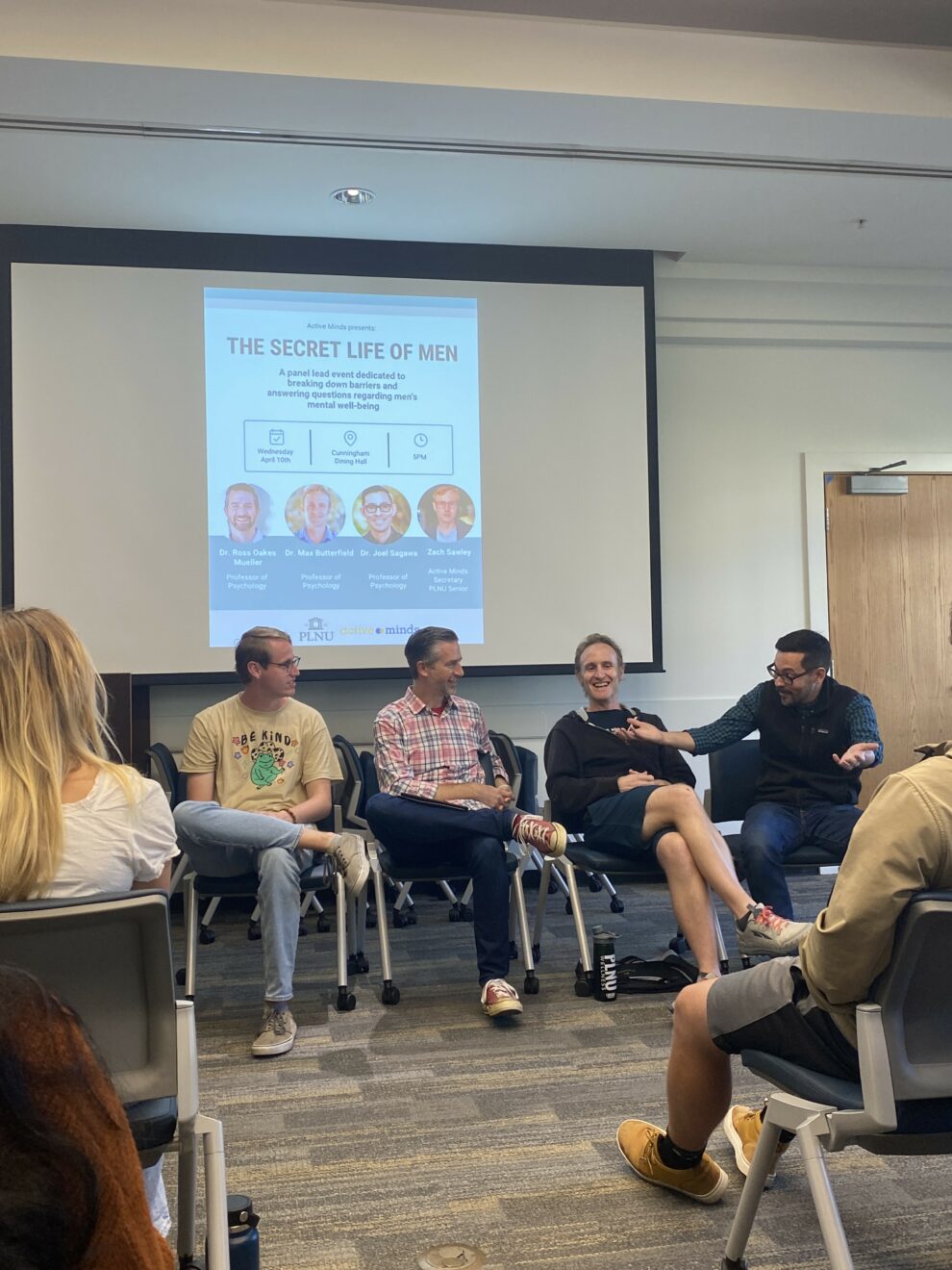Point Loma Nazarene University’s Active Minds chapter hosted a panel event titled “The Secret Life Of Men” from 5-6 p.m. on April 10 in the Cunningham Dining Room. According to the poster, this event was created to “break down barriers” and “answer questions regarding men’s mental well-being.”
The event was led by four panel leaders: Psychology Professors Ross Oakes Mueller, Max Butterfield and Joel Sagawa and Active Minds Secretary and fourth-year psychology major Zach Sawley.
The panelists shared their experiences with mental health and touched on questions relating to topics such as male body image, stigmas of male mental health, the media’s role in pushing societal expectations of men and the influence of social support on improved mental health. Later on, there was a Q&A session where the four answered questions given by attending students.
According to Sawley, men’s health is not as talked about more often because the men who do struggle with their mental health are not speaking up about their experiences. He said he also believes that there is limited research about men’s mental health within the psychology field, and that this results in a greater lack of awareness.
He states that he decided to be a panel speaker for this event because the topic was important to him, and he hoped it would be important for other male students. He said he would have benefitted from a panel like this if it was held in the past.
“As a male student here at PLNU, I have both struggled, and watched other male friends of mine struggle. Unfortunately, both for myself and other men, it often is in silence or alone,” Sawley said.
According to Adia Fadaei, the president of Active Minds and a fourth-year psychology major, this event is crucial because of the disproportionate gender ratio on campus. According to the PLNU website, the undergraduate population is made up of 66% female students and 34% male students (based on data from fall 2021). She said while the larger percentage of women can have many benefits, it excludes male students from conversations regarding mental health and other important topics.
“We chose to talk about men’s mental health because, although men are disproportionately affected by things like suicide and are more likely to have mental health disorders, they also have lower likelihoods of seeking out mental health treatment and talking about it with their peers,” Fadaei said.
Fadaei says there is a limited amount of research surrounding men’s mental health, so the point of the panel is to reduce stigma around the topic by cultivating a conversation through the perspective of a panel. She says there are several different types of stigma surrounding men’s mental health including professional, public and individual stigma.
“A lot of stigma surrounding men’s mental health actually has to do with our narratives of toxic masculinity as they relate to men,” Fadaei said. “Men are not encouraged in our society to speak up, they are not encouraged to be vulnerable. From a young age, they’re told by their familiar figures and other systemic structures that they cannot speak up and they have to ‘man up’ and stop crying. All of those things relate to a lack of help-seeking in men.”
Fadaei said she has witnessed men in her personal and professional communities who have been afraid to be open about their struggles and display vulnerability.
She said although the concept “men talk to conceal” — which means that men tend to have conversations about surface-level issues — may have some benefits, it can be problematic because men may not know what their peers are truly going through.
“I believe currently so much effort has been done to bring women to the center because of the marginalization of women, however, that can really take away from the male voice. We need to emphasize all aspects of diversity, including gender identity and ensure that while we are uplifting women, we are also uplifting men because that is also good for women,” Fadaei said.
Kate Bobadilla, a second-year psychology major, attended the event and said before coming to the panel, she only knew about the impact of men’s mental health on a broad scale based on what she learned in her psychology classes. She said that this event was impactful because it focused on reshaping narratives about men’s mental health.
“I’m sure that years before this, nobody really talked about men’s mental health, so having this event is a huge step toward something bigger,” Bobadilla said.
Maddy Nafarrate, a second-year psychology major who also attended the event, said she was somewhat aware of men’s mental health because her boyfriend has experienced his own struggles with mental health.
“I thought it was really nice to come to this because I was seeing the inside of what it is like for a man,” Nafarrate said.









